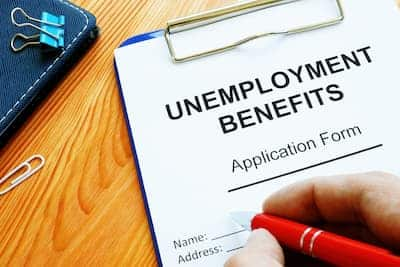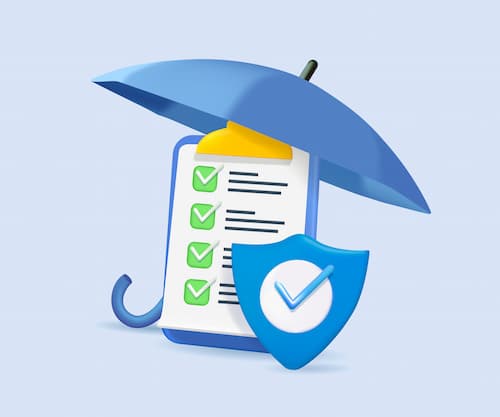- What is job loss insurance?
- How does job loss mortgage insurance work?
- Who offers mortgage protection insurance?
- How does unemployment insurance work?
- How does supplemental unemployment insurance work?
- How long does supplemental unemployment insurance cover your payments?
- How much does supplemental unemployment insurance cost?
- Supplemental job loss insurance companies
- Does homeowners insurance cover job loss?
What is job loss insurance?
Job loss insurance protects you financially if you become unemployed. There are three types of job loss insurance that can help qualified workers:
- State/federal unemployment benefits
- Supplemental unemployment insurance, also known as private unemployment insurance
- Mortgage unemployment insurance, also called job loss mortgage insurance
How does job loss mortgage insurance work?
Job loss mortgage insurance pays your monthly mortgage payment for a specified period while you're out of work.
This type of job loss insurance isn’t private mortgage insurance. Private mortgage insurance safeguards your lender if you can’t pay your mortgage. Instead, unemployment insurance companies offer mortgage unemployment insurance to qualified applicants who meet the following criteria:
- You must buy it before you become unemployed.
- You must be employed full-time in a relatively stable occupation.
- You can’t be self-employed, an independent contractor, member of the military, retiree or someone over age 60 or under age 18.
"If losing your job would likely prevent you from making timely mortgage payments, you're a good candidate for mortgage unemployment insurance in theory," says Brian Martucci, a finance editor for Money Crashers. "The benefit of this insurance is twofold: It can protect your credit score if you can't make timely payments on your own temporarily, and it reduces the risk of foreclosure during an extended layoff."
Certain mortgage protection insurance policies may pay your complete monthly mortgage payment for an extended time. However, most job loss mortgage protection insurance policies only cover your mortgage costs for six to 12 months up to a certain amount. For instance, if your monthly mortgage bill was $1,000 per month, Policy A may pay out $600 while a more expensive policy B would cover the full $1,000.
A waiting period applies, too. Your insurance policy likely won't go into effect for 30 days. Your coverage won't help if you lose your job during that time.
Job loss mortgage insurance premiums can differ. Costs are based on your:
- Mortgage balance
- Home's value
- Health and age
"Expect to pay anywhere from 2% to 5% of your monthly housing payment for mortgage unemployment insurance," Martucci says.
You can also look into disability insurance if you're concerned about making mortgage payments. Disability insurance can help you if you're ever not able to work. Many employers offer short-term policies, or you can find long-term disability insurance on your own. Long-term disability insurance pays you 50% to 60% of your salary if you become disabled and can't work. Many, though not all, insurers offer this form of coverage. Check with your financial planner or independent insurance agent.
Who offers mortgage protection insurance?
Job loss mortgage insurance isn’t common. It is most frequently available through lenders when you take out your mortgage loan.
“Mortgage unemployment insurance is offered infrequently. There are very few companies that offer the coverage, and it has so many exclusions that payouts would be pretty rare,” says Virginia Hamill, a financial writer and former insurance expert with Kin Insurance and Insureon.
How does unemployment insurance work?
Unemployment insurance temporarily replaces part of your income if you lose your job through no fault of your own.
Each state sets its own requirements for eligibility, benefit amounts and benefit length. States base cash benefits on what you earned over a recent 52-week period.
Many states offer a maximum of 26 weeks of cash benefits to unemployed workers. The benefits are intended to replace approximately half of your former wages.
To be eligible for unemployment insurance, you must either:
- Have been involuntarily released from your job
- Be seeking a first job
- Be a gig or self-employed worker
To apply, contact your state's unemployment insurance program soon after losing your job. Provide personal and employment information completely and accurately to avoid delayed benefits.
It can take up to three weeks after you file a claim to receive the initial unemployment insurance check. Additionally, states require that you look for work and be available for employment while you collect benefits.
You may also be required to report to your local unemployment insurance claims office on a date and time slated for you.
How does supplemental unemployment insurance work?
Supplemental unemployment insurance is an optional insurance product. You can purchase on your own if you’re employed or an employer can buy it for you.
This type of job loss insurance is meant to supplement state/federal unemployment insurance benefits. It helps you retain a part of your original salary.
As with state/federal unemployment insurance, you can collect only from a job loss insurance company if you were let go without fault by your employer. If you were fired, quit or retired, this insurance isn’t available to you.
Supplemental unemployment insurance can provide cash payouts that, when combined with state/federal unemployment insurance payouts, equal a maximum of half your weekly pre-tax income paid by your last employer. The job loss insurance company payout depends on the policy and insurer.
Here’s an example:
- You live in Illinois and your yearly pre-tax salary was $80,000 (around $1,538 weekly).
- Illinois’ weekly unemployment insurance benefit amount is 47% of your average weekly earnings over your two highest-earning quarters. The maximum weekly benefit is $484.
- In this scenario, your supplemental unemployment insurance weekly benefit can reach $285. When coupled with the $484 state benefit, would total $769. That’s approximately half of your original $1,538 weekly earnings.
Every supplemental employment insurance policy and insurer has different rules and benefits. Make sure to read the fine print before getting this form of job loss insurance.
How long does supplemental unemployment insurance cover your payments?
Brian Martucci, the Minneapolis-based finance editor for Money Crashers, says supplemental unemployment insurance payout lengths depend on the job loss insurance company.
"Some plans provide a single lump-sum payment after approving your claim. Others pay benefits monthly for a predetermined period – usually not more than a year," he says.
Often, the insurer can follow the same payout schedule as your state's unemployment insurance schedule. So, for instance, if your state unemployment insurance benefits run out after 26 weeks, your supplemental unemployment insurance benefits may also end at that time.
How much does supplemental unemployment insurance cost?
The amount you'll pay for supplemental unemployment insurance varies depending on your:
- Last salary
- Location
- Industry
- Coverage amount
"One insurance company, SafetyNet, previously charged a monthly premium at various price points based on coverage, with policies running anywhere from $4 to $60 per month," Hamill says.
Martucci says you can expect to pay around 1% of your salary, "but your actual premiums may vary."
If employed, check to see if your employer or union automatically provides these benefits at no charge to you if you are terminated without fault. Some businesses offer this insurance instead of or in addition to a severance package.
Supplemental job loss insurance companies
It’s often difficult to find private supplemental unemployment insurance policies.
"This is a niche product that's not offered by many big insurers," Martucci says.
Martucci recommends inquiring with an experienced insurance agent about private supplemental unemployment insurance policies.
"Do your careful due diligence before selecting a policy, and confirm that the insurer is financially sound, as determined by reputable financial strength arbiters like A.M. Best,” Martucci says.
Does homeowners insurance cover job loss?
No, homeowners insurance is not designed to protect you in the event you lose your job.
"Homeowners insurance only covers expenses related to your covered home's structure and certain liability issues that arise on your property," Martucci says.
So, if you're concerned about making sure your mortgage gets paid if you lose your job, you can see what mortgage protection insurance is available in your area.







